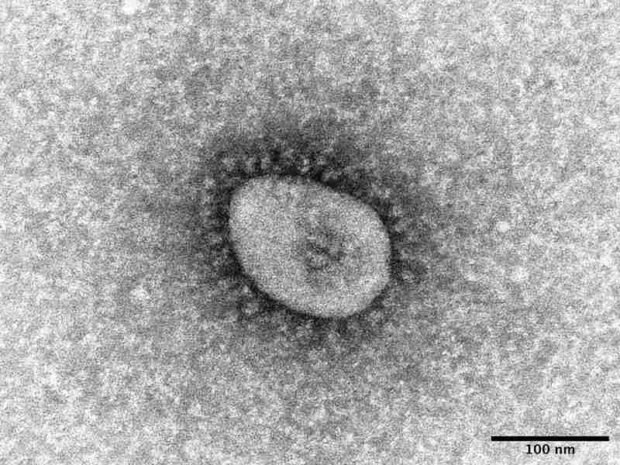
The omicron variant of the novel coronavirus is seen in an electron micrograph. Courtesy of the National Institute of Infectious Diseases via The Japan News/Asia News Network
TOKYO — The Japanese government is aiming to administer new COVID-19 vaccines to everyone who wants to receive them by the end of the year.
This policy was presented to and approved by the Health, Labor and Welfare Ministry’s COVID-19 subcommittee on Wednesday. The ministry wants to be fully prepared for a possible surge in coronavirus infections during the year-end and New Year holidays.
Inoculations are scheduled to start Tuesday. Priority will be given to, among others, people 60 or older who have not yet received a fourth shot.
New COVID-19 vaccines that are effective against the omicron variant — manufactured by U.S. pharmaceutical companies Pfizer Inc. and Moderna, Inc. — were approved Monday for emergency use. On Wednesday, the subcommittee of experts also approved the decision to provide the inoculations for free.
The booster rollout is first intended for people 60 or older who have not yet received a fourth shot, those 18 or older with underlying medical conditions, and medical care workers.
In mid-October, eligibility for the booster shots will be expanded to everyone 12 or older who has already had at least two doses.
To complete the inoculations with the new vaccines by the end of the year, the ministry intends to secure enough doses for the about 100 million people who will be eligible.
Shots of the new vaccines will initially be administered at least five months after a recipient’s last vaccination. But the ministry plans to shorten this interval, partly based on overseas vaccination policies and trends, and will make a decision by the end of October.
A proposal to shorten the interval to three months is also under consideration, to allow the inoculation of elderly people who have already received a fourth shot.
The new vaccines are what is known as bivalent vaccines. They combine elements that target the omicron variant’s BA.1 strain, which was prevalent in the early stages of the omicron variant’s spread, with elements of the vaccines based on the original novel coronavirus.
The new vaccines are expected to have a certain level of efficacy against BA.5, which is the currently dominant subvariant of the omicron variant.
RELATED STORIES
Japan to ease criteria for vaccination sites, to accelerate booster shots
Japan cancels a third of contracted Astrazeneca vaccine purchase